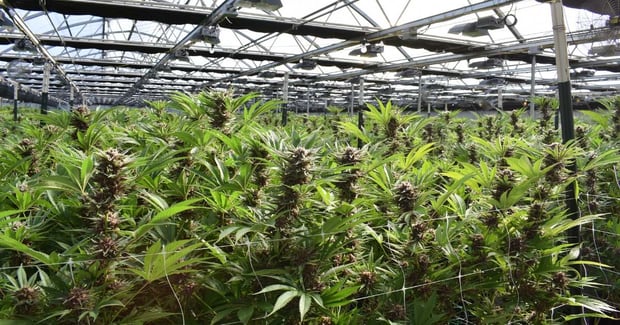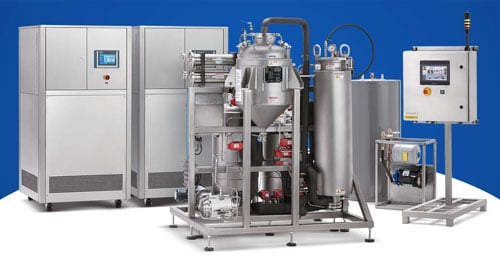Light hydrocarbon solvents (butane and propane) have been the powerful, nonpolar compounds favored by the upper echelon of artisan edible makers.
From the colorful, sugar-frosted gummies to the rich and decadent fudge brownies cheekily laced with cannabinoids, these infused edibles are used for their therapeutic, and often, intoxicating effects.
For home amateurs, an easy ISO quick-wash can produce a rudimentary and solvent-free extract without blowing up the house. For commercial extraction, butane and propane extraction for concentrates provide the highest possible quality, purity, and throughput.

What Are the Best Extraction Methods for Edibles?
As an edibles producer, you have a wide range of extraction methods available to you from solvent-based to solventless techniques. Ultimately, the best extraction methods for you is any one that produces a relatively pure and potent extract.
Supercritical CO2 extraction has been revered for its small eco-footprint and advanced automated controls but CO2 extraction lacks the throughput and terpene extraction potential of butane and propane solvents with a low boiling points.
Ethanol extraction can create pure and full-spectrum extracts, plus it’s easier to maintain a facility due to more efficient storage limits. On the negative side, ethanol can pull out more of the chlorophyll, requiring more post-processing.
Should I Use Propane or Butane Extraction?
Light hydrocarbons like propane and butane don't make you compromise on versatility and efficiency. Butane and propane are nonpolar molecules, known for their ability at picking up cannabinoids, terpenes, and flavonoids.
For instance, a blend of propane and butane yields a far higher range of the plant’s essential oils, cannabinoids, and terpeness resulting in a quality full-spectrum extract. Butane and propane’s versatility allow you to craft desirable full spectrum extracts, isolates, or distillates for crucial market segments.
Distillates can be infused into nearly any edible without affecting the overall flavor of the product. While distillate-based infused products provide a sharp and jolting high, full-spectrum edibles could induce a richer and more complex experience for the user.
What Is the Best CBD Extraction Method?
Ethanol extraction can offer some of the fastest production times without compromising safety and efficiency. Large-scale manufacturers producing hemp-derived CBD infusions with ethanol have the ability to quickly turnaround a product.
In the hustle and bustle of extracting hemp and refining it into a CBD extract with ethanol, you lose some of the selectivity you get with butane and propane. Ethanol can capture less desirable compounds just as easily as cannabinoids.
Butane and propane allow manufacturers to produce a variety of hemp-derived CBD infused products including tinctures, liposomes, gummies, capsules, and baked goods.
Extractors aren’t restricted to pulling out just the CBD with light hydrocarbon extraction. Expect to reap a higher concentration of terpenes, cannabinoids, and flavonoids for inclusion in the edible, which can prove especially helpful for those consuming edibles for medical purposes.
The best CBD extraction method can depend on the type of CBD edible you’re producing. Broad-spectrum or isolates can be made with a variety of methods including BHO extraction.
Cannabis-derived CBD concentrate can be extracted using butane and propane to get all of the compounds, including the small concentration of THC available. Extracting the CBD and its minor compounds can produce a better user experience.
How Is Chlorophyll Removed From Ethanol Extraction?
If you’re dead-set on using ethanol extraction for your hemp or cannabis concentrates, there are a few ways to remove chlorophyll from the end product. Ethanol extraction using chilled ethanol (-40ºC or below) significantly reduces the amount of chlorophyll and other undesirables from the extract.
Dark cannabis extracts can signal a high amount of chlorophyll and other plant matter in the final product. Rotary evaporators can lack the capacity to remove all the chlorophyll from the concentrate.
Activated carbon can be used to remove the chlorophyll and other harsh-tasting compounds, but it can come with some disadvantages. Carbon can reduce your yield by removing some of the hard-labored active compounds you struggled to extract.
Carbon ash can also leach from low-quality activated carbon into your cannabis extract unless you get high-quality reusable alternatives for ethanol extraction.
How Do I Make Edibles More Potent?
A cannabis extract’s potency and efficacy used to be measured by how “high” you got and its THC content alone. Today, we know that there’s more to cannabis products than the THC levels. A complex dance between cannabis and hemp compounds is known as “the entourage effect.”
If you’re looking to capture every last drop of the cannabis resin from the plant, you can’t go wrong with light hydrocarbon extraction.
If you measure potency by its ability to influence or affect the body, butane and propane deliver a full-spectrum concentrate that elicits a more uplifting experience without the pesky side effects such as anxiety and paranoia.
The better question to ask is: How do I make edibles better for me?
Butane and propane give cannabis producers the versatility to cater to different people, each with their own THC and CBD tolerances.
Distillate cannabis oil can produce some robust infused treats with a speedy onset but the effects may not be as long-lasting compared with a full-spectrum-based edible, which elicits a stronger and longer-lasting experience.
Is Isopropyl Alcohol Safe for Extraction?
For the aspiring edible chef at home, isopropyl alcohol can be a tempting solvent used for quick wash isopropyl extraction, also known as QWISO. Generally, isopropyl alcohol can produce a relatively safe extract, albeit, one lacking in nuance, flavor, and potency.
Like other residual solvents, ingesting them, especially in large amounts, can be detrimental to human health. It’s important to ensure the resulting concentrate is completely free from the isopropyl alcohol.
The Takeaway
After it’s all been said and done, butane and propane continue to reign supreme as the ideal extraction solvents for edibles. Commercial edible-makers can trust butane’s efficiency at reaping more of the good stuff and less of the bad stuff.
Butane and propane end up producing a flavorful and strain-specific extract that has enormous potential, especially for future medical applications based on a strain’s unique chemical print.
Luna Technologies is your trusted source for automated, closed-loop light hydrocarbon extraction.
Our IO Extractor is the leading system in BHO extraction and has been peer-reviewed in every legal cannabis state, so you can scale your single or multi-state operation to your wildest dreams.


